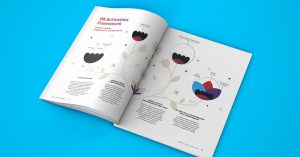Time Regained
The importance of collective intelligence: our experience
Over the past couple of years, our lives have experienced a major breakthrough. In the personal sphere, as well as in the workplace, we have found ourselves rethinking our daily dynamics, changing routines, and facing new – and sometimes even difficult – challenges. Looking at OpenKnowledge and our daily support and consulting activity for companies, the speed of this change had an impact on our action in a two-way direction: on one hand, we created a new way of working as a company, on the other we had to carry out our work with great creativity and resourcefulness, meeting the new and challenging demands of our stakeholders who, like us, found themselves facing a situation of great uncertainty.
Therefore, this was a period of great innovation for us from the point of view of the content and the reflections that always accompany our planning. As often happens, experimentation has given birth to new practices, new knowledge that we consolidated with time, new perspectives through which we can look at the life of the organizations we collaborate with. Reflecting on our experimentation, we felt the need to translate this newly acquired knowledge into something more concrete, which could at the same time be our testimony of what we have learned and an opportunity to share with a wider audience our point of view, our beliefs, and our working methods.
It is starting from these considerations that we have given life to “Il Tempo Ritrovato – Sense-making to build antifragile and courageous organizations”, a supplement to the December 2021 issue of HBR Italia. Today, however, we do not want to talk about what we have developed and the contents we have conveyed in our volume. Instead, we would like to describe the process of conceiving and writing our supplement and, in particular, how we were able to channel the individual requirements of each of us into a common purpose, elaborating a report that is both the result of individual work and of an idea that we share in OpenKnowledge.
A shared mindset
At the heart of our thoughts, of this article, and in a more general sense of our work, there is of course our mindset and our belief that the new paradigm of organizations must be based on people-centricity, a privileged point of observation on corporate life that allows us to be close to people and to exercise empathy in action. In our approach, people-centricity is combined with an ecosystemic vision of organizations. We believe that it is important to encourage the horizontalization of structures, to free the potential for innovation and initiative, removing barriers and stiffness that, in the modern world, prevent organizations from remaining effective, alive, and dynamic enough to respond quickly to the challenges of the context.

System governance
For organizations, the main challenge in the adoption of this mindset is to manage a system that learns to liberate itself, to ensure that even under conditions of greater autonomy of action and decision-making the entire structure can orient itself towards common goals. “Il Tempo Ritrovato” presented us with a challenge, that of orienting our people – the authors of the articles that make up our insert (professionals with different experiences on projects and expertise in different areas) – towards a common goal: describing the experience and method of OpenKnowledge, and at the same time leaving them free to find the best narrative formulas, style, and angle to deal with topics of which they are owners thanks to direct experience, gained from the challenging and unique projects on which we had the opportunity to work over the past year. We worked, for two months, on the activation of a collective intelligence, a dynamic in which the individuals involved worked on the creation of a uniform, coherent and complete result in a scenario of great independence and individual initiative.
The levers of collective intelligence
As we come to the end of our work, we feel it is important to share two insights regarding the activation of this collective intelligence, a dynamic that has allowed both freedom of intent and governance of the outcome:
- The importance of a common vision: the communion of intent, of perspective on the market, and on the type of work that needs to be done with organizations has allowed us to move towards a common goal without difficulty.
- The need to share a culture: sharing working habits – even in a hybrid context – and having the same language has allowed everyone, starting from the general indication deriving from the vision of OpenKnowledge, to physically organize the work, communicating adequately and allowing a natural coordination of themes, intentions and expressed contents.
The value of collective intelligence for OpenKnowledge
The central governance of our project was above all structural, time management, and coordination of teams’ needs dedicated to specific activities. In this context, it was particularly important to bring together the aspect of content – the story of our expertise – with the creative aspect, towards the definition of a concept and a metaphor that could accompany readers throughout the book. The content aspect was entirely delegated to the structure, which was able to express itself in a manner that was coherent and personal at the same time. This is a perfect expression of collective intelligence: our work, the result of the individual efforts of each colleague who has taken part in the work, has gone beyond the dimension of individuality, transforming itself into a choral action, coherent and expressive of the common intention, of the transforming force of our company, based on principles and convictions that are widespread and shared by the people who animate it on a daily basis. By leveraging our collective intelligence, we were able to synthesize our acquired knowledge and methodologies on one hand, and better understand our role in the dialogue and collaboration with organizations on the other. The elaboration of these concepts has led to a new definition of the OpenKnowledge initiative, which revolves around three complementary actions: Change & Evolve (reshaping spaces, behaviors, and work experience to promote organizational change), Unlearn & Learn (acting with targeted interventions by renewing training and focusing on the knowledge that is needed today and that is essential tomorrow), Communicate & Engage (engaging the organization in the creation of new operational and behavioral models desired by people).
This process of reflection born from the collaboration of the people who contributed to this volume is for us a source of great pride: by working both individually and collectively we have discovered that we are able to express the same values, the same intentions, and the same perspective that every day we hope to share with the organizations with which we collaborate and will collaborate in the future.

 2 December 2021
2 December 2021
